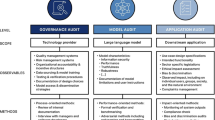Abstract
This document discusses the status of research on detection and prevention of financial fraud undertaken as part of the IST European Commission funded FF POIROT (Financial Fraud Prevention Oriented Information Resources Using Ontology Technology) project. A first task has been the specification of the user requirements that define the functionality of the financial fraud ontology to be designed by the FF POIROT partners. It is claimed here that modeling fraudulent activity involves a mixture of law and facts as well as inferences about facts present, facts presumed or facts missing. The purpose of this paper is to explain this abstract model and to specify the set of user requirements.
Similar content being viewed by others
References
Alonso, J. L., Carranza, C., Castells, P., Foncillas, B., Lara, R. and Rico, M. (2003). Semantic Web Technologies for Economic and Financial Information Management http://nets. ii.uam.es/%7Eaniceto/publications/iswc03-poster.pdf
Breuker, J. A. and Winkels, R. (2003). Use and Reuse of Legal Ontologies in Knowledge Engineering and Information Management. In Proceedings of The ICAIL Workshop on Legal Ontologies
Breuker, J. A. and Boer, A. (2002). Developing Ontologies for Legal Information Serving and Management. In Proceedings of the EKAW Workshop on Knowledge Management through Corporate Semantics Webs
J. Breuker L. Elhag E. Petkov R. Winkels (2002) Ontologies for Legal Information Serving and Knowledge Management T. Bench-Capon A. Daskalopulu R. Winkels (Eds) Legal Knowledge and Information Systems IOS Press Amsterdam
Gangemi, A., Guarino, N. and Doerr, M. (2002). Harmonization Perspectives of Some Promising Content Standards, OntoWeb Consortium http://www.ontoweb.org/download/deliverables/D3.4.pdf
N. Guarino (1998) Formal Ontology in Information Systems N. Guarino (Eds) Formal Ontology in Information Systems IOS Amsterdam 3–15
Graham, J. A. (2003). The Cybersecurities’ Notion of Targeting in General Private International Law. Cyberbanking & Law 5
Geerts, G. (1997). The Timeless Way of Building Accounting Information Systems. OOPSLA Workshop on Business Object Design and Implementation
G. L. Geerts W. E. McCarthy (2002) ArticleTitleAn Ontological Analysis of the Economic Primitives of the Extended-REA Enterprise Information Architecture International Journal of Accounting Information Systems 3 IssueID1 1–16 Occurrence Handle10.1016/S1467-0895(01)00020-3
Gertzenstein, D. A. (2003). An Object Oriented Framework for Business Systems Based on the REA Pattern http://mysite.verizon.net/agertzen/REAFramework.pdf
Leary, R., Vandenberghe, W. and Zeleznikow, J. (2003). Towards a Financial Fraud Ontology; A Legal Modeling Approach. ICAIL Workshop on Legal Ontologies
W. E. Mccarthy (1982) ArticleTitleThe REA Accounting Model: A Generalized Framework for Accounting Systems in a Shared Data Environment The Accounting Review 57 554–578
Mccarthy, W. E. and Geerts, G. (2000). The Ontological Foundation of REA Enterprise Information Systems available at http://www.msu.edu/user/mccarth4/rea-ontology/ index.htm;
W. E. Mccarthy G. Geerts (2002) ArticleTitleAn Ontological Analysis of the Economic Primitives of the Extended-REA Enterprise Information Architecture The International Journal of Accounting Information Systems 3 1–16 Occurrence Handle10.1016/S1467-0895(01)00020-3
Schafer, B. (2001). Grounding Legal Information Systems. Global Review of Cyberlaw. Vol 1.
B. Schafer (1999) ArticleTitleForm Follows Function Fails – as Epistemological Foundation of Comparative Law Social Epistemology 13 113–128 Occurrence Handle10.1080/026917299298664
Schum, D. A. (1994). Evidential Foundations of Probabilistic Reasoning, Wylie
Sheptycki J. (2000). Policing the Virtual Launderette. Money Laundering, New Technology and Global Governance. In ibid (ed), Issues in Transnational Policing. London, Routledge
SUMO, “Financial Ontology” available at http://ontology.teknowledge.com/
Sure, Y. and Lau, T. H. (2002). Introducing Ontology-based Skills Management at a large Insurance Company. In Modellierung 2002, Modellierung in der Praxis - Modellierung für die Praxis, Tutzing, pp. 123–134
Twining, W. (1990). Rethinking Evidence. Oxford
A. Valente J. Breuker (1994) A Functional View of Law G. Bargellini S. Binazzi (Eds) Towards a Global Expert System in Law CEDAM Publishers Padua
Vandenberghe, W., Schafer, B. and Kingston, J. (2003). Light Ontologies for Heavy Criminals? Ontological Modeling and Fraud Investigation in the EU. In Grenon, P. (ed), Reference Ontologies and Application Ontologies, IFOMIS Report, Vol 4, 23–33
Van Kralingen, R. W. (1997). A Conceptual Frame-based Ontology for Law. In Proceedings of The First International Workshop on Legal Ontologies. University of Melbourne
Visser, P. R. S., van Kralingen, R. W. and Bench-Capon, T. J. M. (1997). A Method for the Development of Legal Knowledge Systems. In Proceedings of ICAIL’97. Melbourne
J. H. Wigmore (1928) A Panorama of the World’s Legal Systems Washington Law Book Company Washington
J. H. Wigmore (1937) The Science of Judicial Proof: As Given by Logic, Psychology, and General Experience and Illustrated in Judicial Trials Little Brown Boston
K. Zweigert H. Koetz (1987) An Introduction to Comparative Law (transl. Weir) Clarendon Oxford
Author information
Authors and Affiliations
Corresponding author
Rights and permissions
About this article
Cite this article
Kingston, J., Schafer, B. & Vandenberghe, W. Towards a Financial Fraud Ontology: A Legal Modelling Approach. Artif Intell Law 12, 419–446 (2004). https://doi.org/10.1007/s10506-005-4163-0
Published:
Issue Date:
DOI: https://doi.org/10.1007/s10506-005-4163-0



